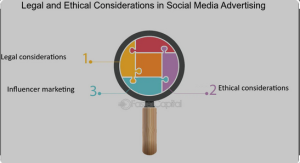Social media marketing and advertising have become integral components of many businesses’ strategies to reach and engage with their target audience. However, there are important legal considerations to keep in mind to ensure compliance and mitigate potential risks. Here are key legal considerations for social media marketing and advertising:

Social Media For Marketing/Advertising; Legal Considerations
Table of Contents
Toggle1. Intellectual Property Rights:
- Trademark and Copyright Compliance: Ensure that your content does not infringe on the trademarks or copyrights of others.
- Ownership of Content: Clearly define ownership of content created or shared on social media.
2. Privacy and Data Protection:
- Data Collection and Consent: Comply with privacy laws by obtaining user consent before collecting and using personal data.
- Privacy Policies: Have a clear and accessible privacy policy outlining how user data is collected, used, and protected.
3. Endorsements and Testimonials:
- FTC Guidelines: Disclose any material connections between your business and endorsers, adhering to Federal Trade Commission (FTC) guidelines.
- Authenticity: Ensure that endorsements and testimonials are genuine and not misleading.
4. Deceptive Advertising:
- Truth in Advertising: Avoid false or misleading statements in your social media content and advertisements.
- Clear Disclosures: Clearly disclose any material information relevant to your products or services.
5. Social Media Platform Policies:
- Terms of Service: Adhere to the terms of service of the social media platforms you use for marketing.
- Advertising Policies: Familiarize yourself with and comply with each platform’s advertising policies.
6. Contests and Sweepstakes:
- Legal Compliance: Ensure that any contests or sweepstakes adhere to applicable laws and social media platform rules.
- Official Rules: Clearly communicate the rules, eligibility criteria, and prizes for any promotions.
7. Employee Social Media Use:
- Guidelines for Employees: Establish clear guidelines for employees engaging in social media on behalf of the company.
- Training: Provide training to employees on legal and ethical social media practices.
8. Accessibility Compliance:
- Web Content Accessibility Guidelines (WCAG): Ensure that your social media content is accessible to individuals with disabilities.
- Inclusive Design: Implement design practices that make content easily consumable by a diverse audience.
9. Geotargeting and Location-Based Marketing:
- Geotargeting Disclosures: Clearly disclose the use of geotargeting and location-based marketing.
- Location Privacy Laws: Comply with local laws governing location-based marketing.
10. Crisis Management:
- Response Plan: Develop a crisis management plan for addressing any negative situations that may arise on social media.
- Timely Responses: Respond promptly and appropriately to customer concerns or issues.
11. Employee Social Media Privacy:
- Respect for Employee Privacy: Balance the promotion of the company’s brand with respect for employees’ personal social media privacy.
- Social Media Policies: Implement clear policies regarding employees’ personal use of social media.
12. Global Compliance:
- International Laws: Be aware of and comply with international laws related to data protection, advertising, and consumer rights.
- Localization: Consider cultural differences and legal requirements when running global social media campaigns.
13. Recordkeeping and Documenting:
- Consent Records: Maintain records of user consent for data collection and use in marketing activities.
- Content Archiving: Archive social media content for compliance and recordkeeping purposes.
14. Influencer Marketing:
- Disclosure Requirements: Ensure that influencers disclose their relationships with your brand as per legal requirements.
- Contracts and Agreements: Have clear agreements with influencers outlining expectations and compliance requirements.
15. Monitoring and Updating:
- Regular Audits: Conduct regular audits of your social media marketing practices to ensure ongoing compliance.
- Stay Informed: Keep abreast of changes in social media platform policies and legal regulations.
Conclusion:
Staying compliant with legal regulations in social media marketing is crucial for maintaining the trust of your audience and avoiding legal issues. Regular legal reviews, clear policies, and ongoing education for your marketing team can help ensure that your social media marketing efforts align with legal requirements. Additionally, seeking legal advice when in doubt about specific issues can be beneficial in navigating the complex landscape of social media marketing laws and regulations.
